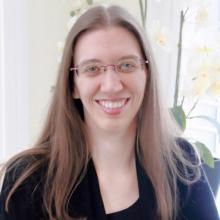Elizabeth Straus
Why did you decide to pursue a graduate degree?
Having volunteered and/or worked with children, youth and young adults with disabilities for almost 20 years, the last eight as a Registered Nurse in Canada and the United States, I have encountered challenges across the continuum of health care and home and community services that research could help improve. The main challenge that initially led me to graduate studies was the transition to adulthood and adult care for young people with disabilities and complex medical needs. In my nursing experiences in adult hospitals, pediatric outpatient services and home care, I saw first-hand the challenges young people and their families experienced preparing for the transfer to and navigating adult-oriented health and social service systems that were not structured to support them. My master’s project highlighted the need for a greater focus on the young adults’ everyday experiences and the influence of social contexts in the adult world, which led me into a PhD.
Why did you decide to study at UBC?
After having completed my Master’s degree entirely online, I was interested in completing my PhD in-person. The UBC School of Nursing offers a world class program and is very well-known for its focus on social justice and equity. The opportunity to work with a supportive supervisor, with deep knowledge and experience with relational and critical orientations, and with the Critical Research in Health and Healthcare Inequities Research Unit in the School of Nursing more broadly, have also provided unique opportunities to explore varied ways of engaging with critically-oriented research with various populations. The graduate residential colleges at UBC were also a huge draw for me – living at Green College for the first two years of my PhD provided a wealth of opportunities for interdisciplinary learning and community-building.
What is it specifically, that your program offers, that attracted you?
The PhD program in Nursing at UBC is a rigorous program that offers a great mix of courses in nursing philosophy, research methodologies and methods, and knowledge translation, but also provides a great deal of flexibility in designing a plan that is tailored to my specific goals and career trajectory.
What was the best surprise about UBC or life in Vancouver?
The UBC campus is situated in a beautiful environment. I am originally from Ontario and have lived lakes and inland in Oregon, USA, but never that close to the ocean. To be able to see the sunset over the ocean or walk down the stairs to the beach anytime was a beautiful aspect of life at UBC I was not expecting.
What aspects of your life or career before now have best prepared you for your UBC graduate program?
My work with young people with disabilities and various communication abilities in the home, community and hospital has provided a vast array of opportunities to build important skills in working with young people with a wide variety of abilities. These experiences have significantly shaped my research methods for my dissertation to attend to and value all the various ways that people communicate and have helped me build the skills that will be essential to working with young people living with HMV who communicate differently. In addition, my teaching experiences in a liberal arts-focused academic institution has further complemented my explorations of philosophy and theory across disciplinary boundaries.
What advice do you have for new graduate students?
PhD work can be a bit of a roller coaster at times; it can also be lonely at times, especially once you complete your coursework. Be kind to yourself. Find opportunities to stay connected with the school and those with whom you feel comfortable sharing your experiences – don’t underestimate the value of a supportive peer group and don’t be afraid to ask for help. I also really encourage graduate students to try whenever they can to take advantage of the opportunities for interdisciplinary learning that exist across the University – there are so many opportunities beyond the classroom to engage with timely and exciting research areas across disciplines and build professional skills that will be applicable no matter your career trajectory.
